Peter MALONE
Saturday, 18 September 2021 19:55
LIberal Arts
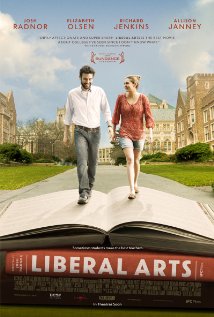
LIBERAL ARTS
US, 2012, 97 minutes, Colour.
Josh Radnor, Elizabeth Olsen, Richard Jenkins, Allison Janney, Zac Efron, Joe Magaro, Elizabeth Reaser.
Directed by Josh Radnor.
There are some films that we really like and identify with – despite any critic telling us that we shouldn’t be giving it any attention. This one seems to have divided reviewers and audiences. It really did it nicely for me! And surprisingly.
On paper, the description would seem ordinary enough. Young man, Jesse, from Ohio finishes his degree and has a job with admissions at a New York university. His relationship breaks up. He accepts the invitation to a farewell dinner from one of his professors. He goes and gets the opportunity to re-assess his life, talking with his professor friend, but making a connection with Zibby (Elizabeth Olsen) the daughter of the professor’s friends. She is nineteen, studying drama and improvisation, is not bashful or shy and finds that she can talk easily and comfortably with Jesse. And, because they live thousands of miles apart, she urges him to write letters. (One hopes that younger audiences are not put off by this advocating of letters!) He is also an inveterate reader of actual books!).
The title indicates that this is a film which relies on the subjects of the liberal arts. Lots of references to and discussions about literature, about drama, about classical music, about history. So, it is aimed at younger audiences comfortable in the world of liberal arts – and draws in older audiences as well. Speaking of young and old, much is made of the age difference, 16 years, between Jesse and Zibby, and the relationship and experiences of young adults and those contemplating moving through adulthood.
With the focus on the professor (Richard Jenkins), we listen to an older man who has had a 38 year academic career, has resigned, then wonders what he has done and wants to take back his decision. Allison Janney plays another academic who has influenced Jesse but who, in real life, is a cold and contemptuous woman. There are two other influential characters that Jesse encounters, one a young man with leftist views who influences Jesse when they chance meet in a park (a surprisingly sympathetic Zac Efron) and a depressed student for whom Jesse becomes a lifeline (John Magaro).
The cast is excellent. Elizabeth Olsen is persuasive as the young woman, sure in manner, less sure in herself and how she should behave. Josh Radnor is sympathetic as Jesse, inviting the audience to empathise and hope that he can settle in his life and grow up as he needs to. He is prone to challenging comments and questions as is Zibby. It must be difficult to act and to direct, which Radnor does, for him to react to lines from other characters with surprise when, in fact, he has written them.
An intelligent, often witty, entertainment for liberal arts-type audiences.
1. The title? Education, learning, culture, wisdom, the arts, in an American context? American college life? Life after College?
2. The contribution of Josh Radnor, directing, writing, playing Jesse? Writing the dialogue from all the characters’ differing points of view and their conflicts and arguments?
3. Ohio, campus, spacious and green, dormitories, lecturers’ homes, diners? The comparison with New York, the apartment, the University, bookshops? The musical score?
4. Jesse’s story, Josh Radnor’s presence and performance, aged 35, his job with Admissions, his conversations with the applicants? The different perspectives on college education? Liking books, and the bookshop? his life and prospects, relationships and break-ups?
5. Phone call from Peter, driving to Ohio, not wanting to fly? Peter’s welcome, Zibby and her parents, the discussions, the meal, application, Zibby and her Improv work? The attraction?
6. The farewell dinner, Peter’s rambling speech? His asking to leave after 37 years? Change of mind, the interview with Robert, the request, the refusal, his harsh attitudes towards Robert and his job and the recommendation in the past? His reflections, seeing universities as a prison? Happy with Jesse’s visit? The second visit, the discussion, the reconciliation?
7. Nate, fantasy, real? His appearance, manner of talking, on the bench, his water, his cap? Chatting with Jesse, advice, going to the party, optimistic view, his appearance in the park again, his listening, Jesse seeing him as a friend? Encouragement?
8. Dean, the young man, the book and his reading, his mental illness, the encounter with Jesse, the conversation, the second meeting, the book, Jesse sympathetic, writing his phone number? The phone call, Jesse flying to see them, Dean’s gratitude?
9. Zibby, age, bond with her parents, talking with Jesse, the meeting, 1130, the coffee, going for a walk, sharing, the argument about reading, the vampire book? Her drama course, Improv?
10. The exchange of letters, Jesse’s return, his reasons, not telling Peter? The discussions, his elitism, the reasons? Zibby’s attitude for people to be happy with what they read? Meeting the roommate, having to move in and out?
11. Zibby proposing that he spend the night, his washing his face, hesitation, her reasons, first love? His decision not to stay?
12. His reaction, meeting the lecturer, praising her for her classes, her gruff manner? Later meeting her, her drinking, the fries, discussions about the poets, the funny stories, her inviting him home, ousting him quickly after the sexual encounter, her offhand remarks, cigarette, the further discussions, her comment on his gooey heart and his holding her partly responsible?
13. Zibby, going to the boyfriend, drinking, sex?
14. The importance of the episode with Dean, Jesse’s kindness, meeting Zibby, the discussions about age, her moving on, his going home?
15. Going to the bookshop, meeting Ana, the talk, comfortable with each other, getting more engaged with life rather than reading books? Their future?
Published in Movie Reviews
Published in
Movie Reviews
Tagged under
Saturday, 18 September 2021 19:55
Rob Roy/1995
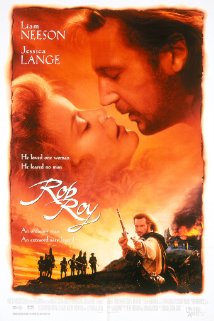
ROB ROY
UK/US, 1995, 139 minutes, Colour.
Liam Neeson, Jessica Lange, John Hurt, Tim Roth, Eric Stoltz, Andrew Keir, Brian Cox, Brian Mc Ardle, Jason Flemyng, David Heyman, Shirley Henderson.
Directed by Michael Caton- Jones.
Rob Roy was made by Disney in the 1950s with Richard Todd as the Scottish hero, a ‘highland rogue’. It was something of a romp, a spectacle, the picture of a Scottish leader.
Half a century later, the material is treated far more seriously. It is a recounting of history in Scotland at the beginning of the 18th century, a drama focusing on Rob Roy Mac Gregor, his leadership, his relationship with his wife, Mary, the treatment by the English overlords, the possibilities of rebellion.
The film is impressive to look at with its Highland location scenery, the poverty of the huts and hovels, the wealth and interiors of the palaces. The cast is very strong, Liam Neeson, just after his portrayal of Oscar Schindler, brings great strength and dignity to his performance as Rob Roy. Jessica Lange is also strong as his wife. Portraying the British are John Hurt, always competent, in his portraying the Duke of Montrose, superior, foppish, ruthless, disliking the Scots. But it was Tim Roth who received a Best Supporting Actor Oscar nomination for his role as the completely dislikeable Archibald Cunningham. Significant in the supporting cast are Eric Stoltz as the young man with ambitions to go to America, Andrew Keir as the Duke of Argyll and, especially, Brian Cox as the treacherous factor.
Audiences will find the social and personal drama very interesting, as well as this dramatisation of a significant period in Scottish history.
1. Scottish history, the 18th century? The film is drama, history, spectacle? The particular emphases?
2. The location photography, the Highlands and countryside, the castles, the huts and hovels? Interiors, wealthy, poor? The contrasts? The musical score?
3. Scotland in that period, the hope for the Stuarts to return, possibilities of rebellion? The dominance of England? Exploitation? The impact of the English presence, government? The prospect of migration to America?
4. The clans, their pride and traditions? Dealing with the English? Rebellion?
5. Liam Neeson as Rob Roy, strong, a leader, love for Mary, his children? His plans? Borrowing money, buying cattle, the land? His dealings with the Duke of Argyll? The borrowing from Montrose? His knowledge of cattle? The importance of being a man of his word?
6. Rob and his followers, the pursuit of the cattle thieves, dealing with them? The warnings? In the inn, the challenge and mockery, the fight, the death, people afraid?
7. Montrose, British, foppish, ruthless? Interactions with the Duke of Argyll, polite, hostile? The bets for the fight? Argyll and the possibility of rebellion? At the end, the fight, the bet and loss?
8. Tim Roth as Cunningham, his background, the bastard, the chip on his shoulder? His skill at swordplay, ruthless, with women, his treatment of Betty and dismissing her? His clothes and debts? With the factor? The pressure on Mc Donald, the attack, the robbery, with Mc Donald’s death, burying him in the
water?
9. Mc Donald, following Rob, friendship and loyalty, the plan to go to America? The experience of the loan, waiting all day for the factor, having to agree to take cash, the fearful journey, the attack, his death and burial?
10. The factor, his status, with Montrose, with Cunningham, taking all day to sign the document, persuading Mc Donald to take cash? Participating in the robbery? With Cunningham, the attack, witnessing the rape of Mary? The final confrontation and his death?
11. The clan and members, their fighting, Cunningham and his violent attack, the fights?
12. Cunningham as a character, ingratiating himself with Montrose, Montrose suspicious of him? Leading battle, the fights, the confrontation with Mary, the rape, the consequences? His capturing Rob, dragging him to Montrose?
13. Rob’s brother, rash, wanting to attack, standing up, shot, having to flee, his death? Mary asking him not to reveal the truth about the rape?
14. Mary, a strong woman, her relationship with Rob, with her children? Betty’s visit, talk, her death? The rape, keeping it quiet? Rob learning about it, talking, the end and her pregnancy, his comment to the children about having another brother or sister? Her going to the Duke of Argyll, pleading Rob’s cause, the issue of rebellion?
15. Rob, challenging Cunningham? Montrose and Argyll and their conversations? Cunningham as a foppish figure, taking off his wig, his skill in swordsmanship, the cuts to Rob? Rob and the big sword, being cut, persevering, falling, holding Cunningham’s sword, killing him?
16. Rob Roy as a national hero, Sir Walter Scott’s novel, the Disney film? His place in Scottish 18th century history? And in the light of Scotland’s later history and moves for independence?
Published in Movie Reviews
Published in
Movie Reviews
Tagged under
Saturday, 18 September 2021 19:55
Youth Runs Wild
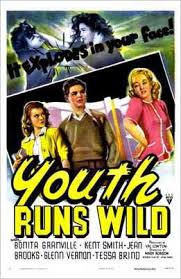
YOUTH RUNS WILD
US, 1944, 67 minutes, Black and white.
Bonita Granville, Kent Smith, Jean Brooks, Glenn Vernon, Vanessa Brown, Arthur Shields, Lawrence Tierney, Dickie Moore.
Directed by Mark Robson.
Youth Runs Wild was intended as a salutary film during World War II. While there was an emphasis on propaganda for the war effort in so many films, this is a rather roundabout war effort film, commenting on the possibilities for young people to run wild, not have aims, not contribute to the war effort.
The film seems particularly dated now. And comparisons could be made with youth running wild 10 years later in the archetypal youths film, Rebel Without a Cause. The behaviour of the young people here seems comparatively mild.
The film shows an ordinary American city, the older generation working in a munitions factory, working in shifts which disrupts family life.
The young boy at the centre of the film has been playing truant, is not interested in going to school, wants to make some money to buy a birthday gift for the girl next door, gets mixed up with the a robbery attempt at a parking yard, there are shots, and the boys in the car are picked up by the police for speeding. The boys are placed by a quite benevolent judge in the care of the boy’s brother-in-law, a veteran who has been wounded and has come back home to be with his wife and daughter.
The girl next door is a good girl but her parents are slack, the father drinking and ordering her around. She has a sense of responsibility for two young sisters. But she is attracted by the boy next door, and becomes involved with the shady garage owner who is responsible for the robberies, and his girlfriend who is on parole. When the boy is forbidden by his family to have anything to do with the girl, she is upset, is asked by her girlfriend to visit the garage owner in hospital and finishes up going to stay with the girl and acting as a hostess at the club.
All works out well eventually, the returning soldier perceiving some of the reality for the young man, talking to the girl and persuading her to come home, while he and his wife, who is presented as unduly critical of the newcomers to the street, looking down on them as riffraff, set up a playground-nursery in the yard for the young children in the street.
The film is based on magazine articles, showing some concern about the younger generation and what the war was meaning to them as well as parents’ strictness, or lack of strictness, and the consequences for the children.
The cast is lesser-known with Bonita Granville acting as the young woman on parole, tough exterior… Kent Smith is a sympathetic veteran of the war. Glenn Vernon is the young man, Vanessa Brown the girl next door.
Some of the acting seems rather stilted and awkward, as is some of the dialogue, prone as it is to moralising and being uplifting. This is surprising because the director, Mark Robson, was working with Val Lewton, the famous producer of horror films in the 1940s.
Which means that the film is of interest historically as manifesting different attitudes in the United States during the war.
Published in Movie Reviews
Published in
Movie Reviews
Tagged under
Saturday, 18 September 2021 19:55
Royal Night Out, A
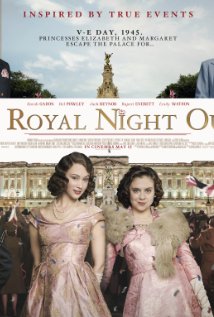
A ROYAL NIGHT OUT
UK, 2015, 98 minutes, Colour.
Sarah Gadon, Bel Powley, Jack Reynor, Rupert Everett, Emily Watson, Roger Allam, Ruth Sheen.
Directed by Julian Jarrold.
Released to coincide with the 70th anniversary of VE Day, the end of the war in Europe, A Royal Night Out tells the story (allegedly based on fact or two) of Elizabeth and Margaret persuading their regal parents to allow them to go out for the evening to join the celebrations in London.
It was not long into the screening before this reviewer thought, “Republicans, beware”. For audiences, much like the character, the soldier Jack, who unknowingly encounters Princess Elizabeth in the pub as everyone wants to listen to the King’s speech, there will be enjoyment reservations. He is anti-establishment, is irritated by the King and by royalty, and is told to pipe down by the awed listeners. Although, by the end, Jack has come to like Lizzie, and so have we. He has spent a lot of the film helping to (or being pressurised to) search with her for Margaret who has wafted off into the night to enjoy herself (including learning how to signal for the bus to stop as well as falling out on top of a soldier), often unwittingly in very dubious company.
But that is probably to take the film far too seriously. It is meant to be a lark. The girls have been sheltered, Elizabeth 19, Margaret 14, not really having had any of this kind of ordinary experience for themselves, except Elizabeth and her work with vehicles during the war, posh style, posh accents (referred to several times throughout the film), and a propensity to order, even make presumptuous demands on the people around without realising it. Actually, Elizabeth has had a night of experiences, learning about people, appreciating that she is mixing with people she doesn’t usually meet, with Jack taking her to the home of his working-class mother with some awareness of what he had experienced as a pilot during the war.
Margaret is flighty, gets tangled with some military types who were letting loose (to put it mildly) with drink and women as they celebrate, but also finds herself accompanying a number of ladies of the night as well as the manager of the Soho “club” to Chelsea barracks. Another military type puts something into her drink so that she becomes quite dipsy when she is tipsy.
The King is of a rather stern demeanour but has let he is daughters go out. The Queen is far more wary, far more prim than her image as the Queen Mother over the decades.
The recreation of the period and of VE night, sometimes with the help of newsreel footage, certainly captures the atmosphere. The performances a strong, Sarah Gadon bringing some intensity to her portrait of Princess Elizabeth, Bel Powley indicates the kind of reputation Princess Margaret would have in the future. It is a surprise to see Rupert Everett as the George VI. Emily Watson fits easily into the role of Queen Elizabeth. Jack Reynor is Jack who is surprised to find himself at breakfast in Buckingham Palace and driven back to barracks, with aplomb and rapidity by Lizzzie. Roger Allam is good as the Soho boss and Ruth Sheen as Jack’s mother.
A Royal Night Out is probably best for older audiences and those who admire the Royal family, but might have a touch of much ado about very little for younger audiences who don’t have an affinity for Queen Elizabeth and her family.
1. A film for Royalists? Whether or not a film for Republicans?
2. The background of the United Kingdom, the traditions of Empire, the role of royalty, class distinctions in the United Kingdom, the role of the military, ordinary people, and comparisons? The world of Soho? The perspective of 70 years later?
3. VE Day, the celebrations, the relief at the end of the war, the anticipation of the King’s Speech, a great deal of flag-waving, respect and loyalty for the monarchy? Londoneris letting their hair down, the crowds gathering, singing and dancing in the streets, the pubs, the clubs?
4. The London of May 8, 1945? Buckingham Palace, the Mall? The Brits, Trafalgar Square, Soho, the Chelsea Barracks? Exterior and interiors? The musical score?
5. The truth of the plot, what if…? In the light of the life of the Queen, of Princess Margaret?
6. The status of the king and queen, Rupert Everett and Emily Watson as the monarchs? The role of the monarchy during the war, leading the nation, relying on Churchill? The King’s reluctance, his speech impediment? The girls, growing up? Elizabeth and the war, working with cars and trucks? Their ages at this time?
7. The King, his speech, wanting feedback, from his daughters? Queen and her prim attitudes? Their appearing on the balcony on VE Day?
8. The princesses, eager, their plea, the parents agreeing, Margaret and the tiara and the guard?
9. The military escort, unreliable, the personal behaviour, drinking, sexual behaviour? To the Ritz, leaving, Margaret on the bus, how to stop it, falling out? The sisters separating? Margaret and her dancing, with the military, the spiking of the drink, her behaviour, being taken to Soho, being sick, the ladies of the night, the men’s advances? The boss and learning the password for Chelsea barracks, taking the women, Margaret’s eagerness? Meeting Ellizabeth? The Lindbergh-hop? Going home, asleep, asking about the knocking shop? The effect of the experience on Margaret – and her later life and career?
10. Elizabeth at 19, serious, wanting to go out, her war experience and the driving and mechanics? Separating from Margaret? Her concern? At the Ritz, the behaviour of the escorts? In the pub, meeting Jack, his anti-royalty stances and talk, her reaction? Listening to the King’s speech? The pressure on Jack to help her, talk, giving orders? Going to the club, the payment to get in, Jack giving the money? The information about Soho, going to the club? Going to the Chelsea Barracks, on the boat, the payment? At the barracks, his not being allowed in, Elizabeth going in, the dancing, Jack and his devices of getting past the guards? Discovering Elizabeth, Lizzie, was the Princess?
11. The picture of the military, their drinking, irresponsibility, with the women, spiking drinks, at the Chelsea barracks?
12. The scenes in Soho, the situation, the brothel and the club, the boss, the bouncer, the violence, the fight with Jack? Getting the password, going with the women, exploitation at the barracks? The behaviour of the women, talking with Margaret?
13. Jack, his work in the war as a pilot, sad, in the pub, the critique of the Royal family, Elizabeth and her pressurising him, paying cash, disappearing, found, going to the club, going to Soho, the bashing, on the boat? The barracks, his discovering the truth?
14. Jack’s mother, an ordinary woman, in the street, talking with Elizabeth? Jack and his war effort? The deaths of his friends? AWOL and deserting?
15. The picture of the princesses, upper-class, the comments on their posh accents and behaviour? The contrast with ordinary people?
16. Getting back to Buckingham Palace, the explanations to the King and Queen, Margaret and her questions, Jack invited to breakfast? Elizabeth driving
him back to the barracks, his joining his squad?
17. Happy endings – in view of the history, especially of Queen Elizabeth?
Published in Movie Reviews
Published in
Movie Reviews
Tagged under
Saturday, 18 September 2021 19:55
Pitch Perfect 2
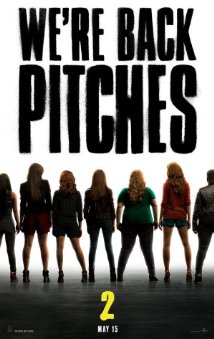
PITCH PERFECT 2
US, 2015, 115 minutes, Colour.
Anna Kendrick, Rebel Wilson, Hailee Steinfeld, Brittany Snow, Skylar Astin, Adam DeVine?, Ben Platt, John Michael Higgins, Elizabeth Banks.
Directed by Elizabeth Banks.
Audiences and critics were surprised and many delighted when they saw Pitch Perfect in 2012. In fact, the producers were also more than delighted with the response and decided that a sequel was in order. The sequel doesn’t have the surprise of the first film but certainly matches it in entertainment value.
The setting is a college where there are A Capella choirs, a competent male choir but, when you come to think of it and look at the members of the choir, an extraordinarily successful female choir, The Bellas. The film opens with a reminder of their success in the first film, coming from almost nothing, with an eccentric group of characters as singers, to win competitions. And here they are, with President and Michelle Obama edited into the audience!
A good deal of the success of the first film was the presence of Rebel Wilson, keeping her Australian accent as Fat Amy, direct in what she says, caught up in many faux pas, and ruining the gala performance with a garment split while she is suspended high above the stage, causing gasps, instant photos, journalistic scandal, the mockery of the commentary team, the displeasure of the principle of the College and their exclusion from further competitive performing. So, we know where this is all heading.
In the first film, the comperes, John Michael Higgins and Elizabeth Banks (who also directed this film), were very amusing and are here, he an absolute chauvinist, she taunting him without his realising.
Into the mix comes a young enthusiastic girl ( Hailee Steinfeld) whose mother was a Bella and who is absorbed the atmosphere of the group and wants to audition. She also writes her own songs. With great ease, she fits into the group, even attracting the attention of one of the boys in the other choir.
The main rival to success is a German, particularly Teutonic, group, The Sound Machine, dressed in black, severe and with arrogant comments, athletic and robotic movements, with the leaders staring down and intimidating Beca, one of the inspirers of the Bellas. The screenplay provides several occasions for dance-offs between The Sound Machine and The Bellas, especially when a fan of A Capella groups holds a private competition with five groups, each working off the other.
One of the other realities the women in the group have to face is that they are ending their years of college and have to prepare for life after. Beca is enterprising and has won an internship with a record company, with a hard-driving producer who is impressed when she suggests a way of accompaniment for an album to be made with Snoop Dog and Christmas songs.
The group also goes to a retreat run by one of the former Bellas, a two-day experience of physical training, singing, bonding. Which means that they are then ready go to Copenhagen to vie for the international competition and title – and trying to outdo The Sound Machine.
Several of the cast return, especially Anna Kendrick as Beca and, as mentioned, Rebel Wilson as Fat Amy. The boys are back, and there is and touches of romance – but, especially Fat Amy and her relationship with security guard, Bumper, but she almost spoils it all, The retreatmakes her realise that she is in love and paddles, literally, a canoe across the river to be reunited with him.
Not something that will stay all that long in the memory, but with the performances, the humour, the range of music, it is pleasant while it is there on the screen.
1. The popularity of the first film, becoming a cult film? The female perspective, women, singing, ambitions?
2. The focus on music, A Capella?
3. The title, the rehearsals, auditions, the choir, performances?
4. The status of the Bellas, the winners, their performance, success? In Washington, President Obama and his wife in the audience, the accident, its being filmed, the reaction of the journalists, the commentary? Fat Amy and the disaster?
5. John and Gail, the commentary, with the principal of the College? The rules, the choir being excluded?
6. John and Gail, the personalities, humour, John as chauvinistic, his putdown of women? Gail and her innuendo remarks?
7. The women in their final year, life after college, Becca and her ambitions, Chloe and her not facing leaving? Fat Amy? The bonds between the women, the other members of the choir, their personalities, eccentricities? The reaction to being excluded?
8. Emily, arriving with her mother, her aims, her mother as a singer, joining the Bellas, the meeting, her enthusiasm, the audition, singing, her own song, Fat Amy and the comments about talking about Emily when she was present? The vote, acceptance? Benji and his attention to her? Writing her songs, Becca and her help, the recording, the production of the song? The producer himself, listening, accepting it? Singing the song in the finale?
9. Becca, her role with the Bellas, going to the internship, the interview, the menial jobs? The support of Aston? With the group, the boss and his lectures, continually putting down Dax, Snoop Dog and his songs, the Christmas disk? Her idea, the rhythm, the favourable response? Her not telling the group that she was doing the internship?
10. Chloe, her leadership, upset about the exclusion, her fears, deciding to graduate?
11. Fat Amy, her dialogue, the zingers, the truth, blunt speaking, the opening accident, her apology? Her participation in the group? The boy and his kiss, his preparing the food in the gazebo, rejection, his being hurt? Her realisation that she loved him? The canoe across the river, her love and the kiss? Reconciliation? And the final credits with his singing and the audition?
12. The Sound Machine, German, the personnel, the vivid performance, the Teutonic repartee, superiority, Becca’s reaction?
13. The A Capella fan, the club, the competition, the teams? The male group from the College? And their initial performance for welcoming the students for the academic year? The Green Bay team? The other exuberant men? The categories of singing, the competitive element, each working off the other, the eliminations? Emily and her singing her song and their being eliminated?
14. The retreat, the former Bella, the cramped conditions, tough, singing and the physical activity? Surviving, the camp, their feeling together and ready for the competition?
15. Copenhagen, the site of the competition, everybody getting ready? The audience, Benji and Aston, the Sound Machine and the performance, the Bellas and their song, Emily’s song, the lights, everybody joining in, the success?
16. The aftermath, a new stage in life? Success?
Published in Movie Reviews
Published in
Movie Reviews
Tagged under
Saturday, 18 September 2021 19:55
Walking the Camino: Six Ways to Santiago
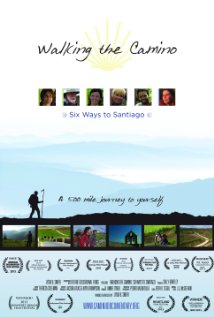
WALKING THE CAMINO: SIX WAYS TO SANTIAGO
US, 2013, 86 minutes, Colour.
Directed by Lydia Smith.
Many people, Catholics, Christians, people of other faiths, or professing no faith, have toyed with the idea of walking the Camino. For those who saw Emilio Estevez’s film with his father, Martin Sheen, The Way, a group of fictitious characters walking the period pilgrimage to Santiago de Compostela, the idea might have been reinforced. There is every possibility that those who watch this documentary will be fascinated, again wondering if they should…
On the other hand, audiences who watch the film, in the comfort of the cinema or in a lounge chair at home, might well feel that they have actually made the Camino and now they won’t have to leave home, but, maybe, will watch the documentary again.
The director, Lydia Smith, joined a number of pilgrims at the starting point at St Jean Pied de Port in France, approaching the Pyrenees. It is by chance, or by providence, that these individuals start their walk at the same time, progress over 30 or more days, meeting each other, talking or sharing silence, reflecting on their lives, their prayer and God’s role in their lives, enjoying the mixture of accommodations along the way, becoming friends – allowing themselves to be photographed, at their best as well is in some of their pain, and sharing many of their views to camera.
In this way, the audience in those comfortable chairs, shares in the experience of what happens in the Camino, meeting the different pilgrims, getting to know them, to like them, like some very much, enjoying their company, anxious for them at times, but eager to learn more and more about what the experience of the pilgrimage means to them.
One of the main attractions is that the photography of quite a range of terrains, mountains and plains (with somebody even mentioning where the rain in Spain stays), villages with the touch of the mediaeval, cities with magnificent cathedrals, the gamut of vistas along the top of northern Spain. Somebody mentions that it is like walking through postcards.
Some of the pilgrims include a young articulate man from Portugal, very genial, always a pleasure to hear what he has to say and how he is found the Camino. On the other hand, there is a mother with her three-year-old son, who confides to camera that the reason he is on the Camino is that he had no choice! She is travelling with her brother, who enjoys company and partying and has no faith and who does not seem to benefit much from the experience. It should be said that the mother walks these hundreds of kilometres, mostly pushing her son in his pram. There is an elderly American widower and an elderly friend from Canada (who gives the impression that he could be a priest). There is a girl from Denmark who is befriended by William from America. They help each other and it is they, for the purpose of the film, who travel the extra 80 km west to the Atlantic, to Finisterre, where in those days it was a fitting conclusion to the Camino because it was considered to be the end of the flat world.
The film is not heavy on ecclesiastical interventions. Throughout the film, several clerics do give explanations about St James, Santiago, the discovery of his tomb, the centuries-old pilgrimage, prayer, faith, the scrutiny of one’s life, one of the pilgrims even referring to the experience as an internal Camino. Some of the pilgrims remark that they are confused by what may be beyond the visible, that there may actually be something beyond, but simply walking this day as best they can is the best they can do. Life and spirituality are intertwined.
In case anybody is still toying with the idea of actually going, there are scenes of the Alburges, the hotels, or hostels, available the pilgrims after they have had their documents stamped and can get a meal, have a sleep in close, very close dormitory style, helped by a number of volunteers who are of great assistance to the pilgrims. Somebody mentions snoring! And, there are many sore feet, and we see a range of blisters.
There are rituals on the way, including some of the pilgrims experiencing a washing of the feet, in the vein of the Last Supper.
Some of the remarks by the pilgrims including those nuggets of wisdom: the Camino is a simple existence which is somewhat addictive; being close with the pilgrims is a kind of cohabitation, without any competitiveness; it is walking and the people you meet, with happiness meant to be shared.
This is not an overlong documentary, is audience-friendly, communicates a great deal of what the Camino is about and a great deal of what happens and what can happen along the way. While the theme is spiritual, the film communicates a great deal of ordinary and welcome humanity.
Published in Movie Reviews
Published in
Movie Reviews
Tagged under
Saturday, 18 September 2021 19:55
Enemy
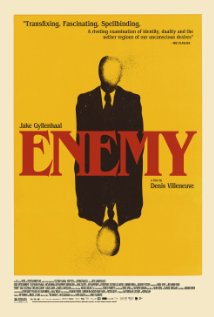
ENEMY
Canada, 90 minutes, Colour.
Jake Gyllenhaal, Melanie Laurent, Sara Gadon, Isabella Rossellini.
Directed by Denis Villeneuve.
Enemy is a brief film with more than a touch of the weird. But, it is of particular interest as a film by the Canadian director Dennis Villeneuve, whose film the excellent Incendies was nominated for Best Foreign Language film, Villeneuve following it up with the English-language excellent drama, Prisoners.
Jake Gyllenhaal was one of the stars of Prisoners. Here he has the opportunity to play two characters, doubles, who discover each other, meet and discuss, find that each has a relationship – and, at the end, each decides to pass himself off to the women as their husband or partner.
There is no particular resolution, the interest being in the characterisations of the two men, their interactions, the experience with the women.
The two women are played by Melanie Laurent and Sara Gadon while there is a sequence with Isabella Rossellini as one of the men’s mothers.
The film opens with a strange colour scheme, yellow and black, dark corridors, light and shade, shadows which opens the film with a particular style, leading us into the experience of the doubles.
1. The film as something of a weird experience? The initial comment about chaos and order not having been yet deciphered? What was normal? Not?
2. The city of Toronto, the vistas, University lectures, offices, the streets, apartments? The blend of the real and the surreal?
3. Colour, light, darkness, silhouettes?
4. The title? The title of the novel, The Double?
5. The credibility of the plot, the two men and their identities?
6. Adam, his life, the initial corridors, the sexual performance, the audience of men? At home, his relationship with Mary and her coming and going? The style of his life, appearance, giving the lecture, talking about power and control? The chat with his friend, the recommendation of the film, where there’s a will, there’s a way? In the shop, watching, seeing his double? Curious, Googling, the films, going to the office on the Saturday, the security guard believing him, getting the parcel? His phoning Anthony? Talking with his wife, her apprehensiveness?
7. Anthony, his wife, her pregnancy, her suspicions?, Appearance, personality? The phone call from Adam, the decision to meet, the city, the talking, interrogating each other, tensions? Differences? The rapport?
8. Adam and his visits with his mother, that he was the sole child – but her comment about the third rate film career?
9. The effect of the experience, one following the other, to the university? Antony’s wife sitting on the bench?
10. The effect on both men, making decisions to go to the opposite women? Adam and his encounter with the pregnant wife, changing into Anthony’s clothes, his reticence, the sexual response? Anthony and the sex with Mary, her noticing his ring finger, upset, the drive and the crash?
11. Adam and his decision as to which identity he should take?
Published in Movie Reviews
Published in
Movie Reviews
Tagged under
Saturday, 18 September 2021 19:55
Very Good Girls
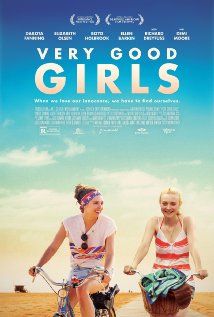
VERY GOOD GIRLS
US, 2013, 91 minutes, colour.
Dakota Fanning, Elizabeth Olsen, Boyd Holbrook, Ellen Barkin, Clark Gregg, Richard Dreyfuss, Demi Moore, Peter Sarsgaard.
Directed by Naomi Foner.
Very Good Girls was written and directed by Naomi Foner, screenwriter, especially of the 1988 Running on Empty. Naomi Foner was previously married to director Stephen Gyllenhaal.
This is a story of two young girls in New York City who have remained virgins up till their time of preparing to go to college. One, Dakota Fanning, comes from a professional class family, the father, Clark Gregg, a doctor and the mother, Ellen Barkin, a psychologist. The house is run very strictly but goes into turmoil when the daughter discovers her father having an affair. There is great contrast with the home of the other girl, Elizabeth Olsen, with a very cheery spirit, a sometimes raucous father played by Richard Dreyfuss, with a strong mother who keeps in the background, Demi Moore.
The girls dare themselves to go swimming, naked, at Brighton Beach, and encounter a young men who sells ice creams but who is a photographer, Boyd Holbrook. One of the girls becomes infatuated with him, while the other seems to have some disdain but encounters him and falls in love, having an affair, which she does not communicate to her friend. It is inevitable that there will be hurt, betrayal, recriminations.
Of interest, the boss of the New York Ferry where the Dakota Fanning character works, is played by Peter Sarsgaard and, Naomi Foner’s son-in-law since he is married to Maggie Gyllenhaal.
This is a good and sensitive role for Dakota Fanning, and Elizabeth Olsen, facial features-wise, could easily play Maggie Gyllenhaall’s sister in a film.
1. In New York story, the city, the suburbs, the ferry, the apartments, Brighton Beach? New York atmosphere?
2. The title, the focus on Lilly and Gerry? A moral perspective, judgement?
3. The opening, the girls and their bikes, the beach, the dare to go naked into the sea, people watching, the boys coming to the water, the girls saying they were Romanian?
4. The summer holiday, the plains to go to college? Life in the home, Lilly, the young sisters, the stern mother, psychiatrist, tense, controlling? The father, the doctor, Lilly finding him with the girl in the office, the dismay? The contrast with Gerry’s house, noise, the children, the boisterous father, the response of the mother? Lilly enjoying Gerry’s house?
5. At the beach, the ice cream, the encounter with David, Gerry flirting, Liliy’ disdain, his taking the photo, on the poles? Gerry contacting him? His seeing Lilly, following her?
6. The girls, the impact of their families, the issue of sex and virginity, seeing virginity as a barrier to be overcome?
7. David, the encounters with Lilly the attraction, his apartment, his photography? His kiss, her resistance, their affair? The passion? The effect on Lilly? Her being unable to tell Gerry?
8. The visits to the houses? The barbecue and Gerry’s father? The suddenness of his death? Gerry’s reaction, emotionally? Lilly getting David to visit her, her advances, her telling Lilly about the sexual encounter? The effect on Lilly, hostility towards David?
9. The situation, Lilly wanting her father to come back, talking with him, his not being willing? The reaction with her mother? Taking it hard and acting severely? Leaving the house, leaving the room tidy? Seeing her father, his return, upset because she had asked him many times, his saying that her mother had asked this time? The parents wishing Lilly well?
10. Lilly on the ferry, guide? The friendship of the manager, his approach and Lilly leaving? Her return and his saying goodbye?
11. David, his interactions with the two girls, Lilly severe, the decision to go to Paris? The farewell, Lilly going, hiss telling the truth? Gerry seeing Littly, upset?
12. Gerry coming to farewell, the embrace between the two, audiences wondering about the future, David and his return from Europe a relationship with Lilly or not? The continuing friendship with Gerry?
Published in Movie Reviews
Published in
Movie Reviews
Tagged under
Saturday, 18 September 2021 19:55
Finders Keepers
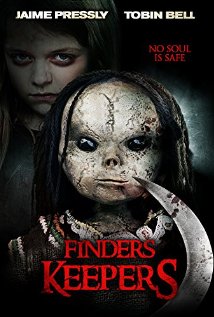
FINDERS KEEPERS
US, 2014, 90 minutes, colour.
Jamie Presley, Patrick Muldoon, Tobin Bell, Justina Machada, Kylie Rogers, Mary Pat Gleeson.
Directed by Alexander Yellen.
Finders Keepers is one of those familiar stories where a tragedy, preferably gory, happens in a home which then goes on sale and an unwitting family buys it and moves in only to experience something of the horror of what went on before.
The film opens with police going into the house, finding the dead bodies of a family, themselves being killed, and the audience seeing an intense young boy with strange eyes. We discover later that he has been put into an institution.
Moving in are a mother and daughter, having time away from the father who seems to have been philandering. As they unpack, the little girl discovers a voodoo-looking doll and becomes attached to it – with, of course, the spirit of the doll entering into the little girl and causing her to be malevolent, including deaths of those who cross her.
With the help of a friend who is an academic an expert on this kind of doll, the mother and father try to protect their daughter, going through a ritual to exorcise her.
They are successful – but, the young boy who is now grown up, escapes from his institution and lurks at a street corner…
1. An interesting and entertaining horror film? More accessible, less blood and gore?
2. The locations, San Francisco, apartments and streets, the universities lecture rooms, Monterey, the new house, the interiors, the neighbours, hospital, the psychiatrist’s office? Musical score?
3. The prologue, the police, the night, the discovery of the bodies, the deaths, the policeman and the policewoman? The glimpse of the boy with his doll? His blank eyes, the knife?
4. The familiar genre, the family occupying a house where a massacre took place? The aftermath, the effects? The investigation about the previous family? Events being repeated?
5. Alyson, Claire, arrival at the house, the estate agent and his praising the houser? The exteriors, the facade and the angle, repeated during the film? Rooms, Claire, unpacking, finding the doll in the floorboards, attracted to the doll? The mother and the doll, her cleaning the doll?
6. Life in the house, ordinary, Alyson separated from her husband? The visit of the nosy neighbour’s? Claire at school, her drawings, the children’s comment about the house, her scream? Her being taken to the psychiatrist, his interviews, her drawings, the next interview and the bruise, the issue of abuse, the psychiatrist accusing her mother? His later looking at the video, the sinister look from Claire? His death?
7. The deaths, the neighbour and the destruction of the cats? Going to the diner, the waitress and the offer of a new doll, her being tormented, fire, the diner, the explosion? In San Francisco, her father and his girlfriend, the gift of the doll, the tearing of the doll to pieces? The sinister remarks, attitudes?
8. The doll, its appearance, Alyson taking the doll to her academic friend, the lecture, the explanations, the links between the doll and people? possession?
9. Claire and her behaviour with the doll? Attached? Attacking anyone who took it away? The attempts to find some normality in the city, the doctor’s questions?
10. The effect on the parents? The effect on the academic, the assistant and her being killed? The lecturer, helping to find Claire, the attack, the dousing with petrol?
11. The doctor, trying to get in touch? The phone call from the doctor and finding him dead?
12. The advice about the eyes, Clare and her parents, the father and his pulling out of the eyes, the plan? His stamping on the eyes and the doll?
13. Everything seeming normal, the family together again?
14. The mother’s visit to the institution, seeing Zachary, questioning him, his disappearing – and the final image of him looking and smiling?
Published in Movie Reviews
Published in
Movie Reviews
Tagged under
Saturday, 18 September 2021 19:55
Assassination Tango
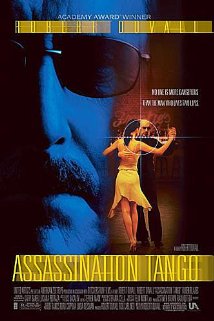
ASSASSINATION TANGO
US, 2002, 114 minutes, colour.
Robert Duvall, Kathy Baker, Luciana Pedraza, Ruben Blades.
Directed by Robert.Duvall.
Assassination Tango was written and directed by Robert Duvall, clearly a labour of love. With his long and successful acting career, Robert Duval directed his first film The Apostle, in 1997, receiving critical acclaim for his performance and his direction.
This time he is a semi-retired hitman, seemingly with little conscience about his work, but trying to reconstruct his life in New York City, an attachment to mother, Kathy Baker, and her young daughter, for whom he becomes a father-figure.
However, he receives a call to go to Argentina and to assassinate a general who is responsible for the disappearance of a lot of Argentinian citizens. His being employed by a family who are seeking vengeance. The contact is played by Ruben Blades.
However, the hitman is attracted by the music, the movement, the partnerships in the Tango, becomes involved with an instructor, learns the steps, enjoys the dancing, has a relationship with her.
In the meantime, the target is hospitalised and so the hitman is delayed in Buenos Aires. However, the time comes when he uses his expertise in disguise, coming at his target from an unexpected angle, achieves his mission, and is able to get documents to return him to New York City and his “normal” life.
1. Robert Duvall, writing, directing, acting?
2. The credibility of the plot, international hitmen, conspiracies?
3. New York, the apartment, the family lifestyle? Buenos Aires and the contrast, the city and views, apartments, hotels, connections, homes? The target, his home?
4. The title, the Tango, John and his love for Tango, in New York, and in Buenos Aires, the lessons, performance? The dancers, the instructors, relationships?
5. The seeming normal background the John, his age, relationship with Maggie, little girl, the outings? Preparation for the birthday? His being a father figure?
6. The background in Argentina, the generals and their regime, disappearances? Murders? The atmosphere for vengeance?
7. John, his normal life, the connections, visits, the personnel, requests in New York, discussions, his reputation, past hits, arrangements to travel, the connections in Argentina?
8. Johny, arrival in Argentina, Miguel, the connection at the airport, meeting the family, the discussions, the plans? The impact of their history and losses?
9. The police, their investigations, tracking assassins? Arrests?
10. John, his stay, undercover, growing the beard, disguise? Making contacts with the family and his connections? Miguel, arrests torture?
11. The Tango, the encounter with the instructor, good connection, the lessons, the relationship, sexual relationship? Dancing?
12. His methods, clever, surveillance of the house from unexpected angles, waiting during the general’s illness?
13. The confrontation in the garden, the killing, the general’s wife?
14. Leaving Argentina, the connections, documents, the cover? Back to New York, normal, Maggie and the little girl?
Published in Movie Reviews
Published in
Movie Reviews
Tagged under